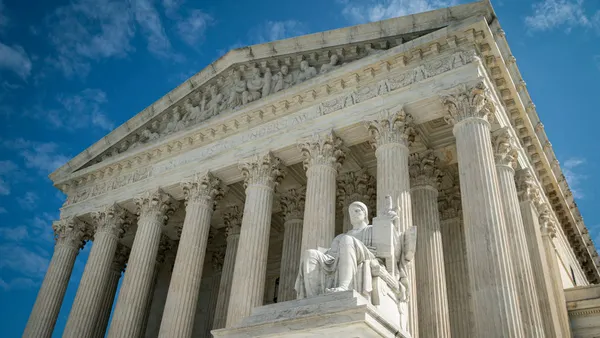Editor's note: This is a contributed piece by Keith Markel, a partner in Morrison Cohen LLP’s Labor and Employment, and Business Litigation departments.
While many look forward to celebrating with their colleagues at the annual holiday party, the reality is that the event can result in trouble for both employers and employees. In light of the recent flurry of sexual harassment claims, employers, regardless of their size, must be more vigilant of the risks involved.
Sexual-harassment allegations, assault complaints, personal injury claims and other legal problems stemming from the annual holiday party have become increasingly prevalent over the years — yet many claims arising from the annual holiday party still go unreported.
So how do you mitigate the pitfalls that can result from holiday party celebrations?
What is the number one recommendation to reduce risks of "unsavory behavior" and accidents that may plague holiday parties?
The safest bet is not to have the holiday party. And some companies this year have made the decision to cancel their annual celebration. But most companies won’t.
The annual holiday get-together is an opportunity to bolster morale after a long year of work. The unfortunate reality is that holiday parties create an increased risk of liability and danger for both employers and employees, but there are ways to mitigate them.
The culprit behind so many incidents seems to be alcohol. What can companies do to reduce alcohol-fueled holiday party liabilities?
The safest recommendation is, of course, to skip serving alcohol at the annual holiday party. However, we recognize that is unlikely. If you choose to serve alcohol this year, here are my recommendations:
- Have service providers handle all alcohol and bartending duties. No employees should be allowed to serve alcohol to themselves or to others.
- Instruct bartenders to cut off service to employees who appear to be intoxicated or acting inappropriately.
- Serve food throughout the time that alcohol is being served. Avoid the cocktail-only hour.
- Consider serving only beer and/or wine.
- If serving spirits, request that the bartender prepare low-alcohol mixed drinks.
- Offer a wide variety of non-alcoholic drinks.
- Limit the number of free drinks per person.
- Limit the hours that alcoholic beverages are served. For example, stop alcohol service at least an hour before the event is scheduled to end (this is a practice employed at most sporting events and has proven an excellent deterrent to employees leaving the holiday party in a state of diminished capacity).
- Encourage people to stay for coffee and dessert after you stop serving alcohol. This may be a good time to schedule any speeches or presentations.
So the company has decided to have the party and to serve alcohol. Holiday parties tend to encourage employees to behave in ways that they normally wouldn’t in the workplace. What else can be done to mitigate problems that may arise?
Despite best intentions and efforts, someone at the holiday party is bound to forget about the anti-discrimination and anti-harassment policies and general codes of conduct that govern the workplace, all of which apply equally in the holiday party setting and must be strictly adhered to in any employer-sponsored event.
I recommend the following steps to reduce the risks of liability:
- Employers should confirm that their insurance policies cover the holiday party, regardless of party location.
- Just before the party, employees should re-read the employer’s code of conduct as well as its anti-discrimination and anti-harassment policies. Employers should consider republishing them or circulating them to employees around this time of year.
- Employees should be reminded and understand that these policies apply to employer-sponsored social events both inside and outside of the office.
- Employees should be reminded and understand that they will be subject to discipline if they violate these policies during the holiday party, including possible termination.
- Employees should be reminded and understand that "after-party" festivities are not encouraged nor are they sponsored by the employer.
- Employers should remind managers and supervisors of these policies and what to do if they learn of or witness any potential violation of these policies at the holiday party or afterwards.
An often-overlooked area is transportation after the holiday party, regardless of whether alcohol is served at the gathering. What should employers keep in mind?
Transportation and related safety issues after a holiday party should be taken as seriously as any other day traveling to and from work. Some helpful tips employers can follow:
- Remind employees not to drive if they intend to drink at the party.
- Employees should be reminded of the requirement that they be as responsible for themselves on the holiday party night as they would on any other night they are out of the office and responsible for their own safety and well-being.
- Provide transportation options for all employees and, if necessary, at company expense. It’s a small price to pay and should be factored into any holiday party budget.
- Consider using a car service or a shuttle service for multiple riders to be dropped off at home or at public transportation destination sites. Car services should not be used to shuttle employees to bars or nightclubs.
- Encourage the use of prearranged designated drivers or public transportation, where appropriate.
- In all instances, an employee who appears to be intoxicated should be provided with a ride home.
- Inform employees in advance of the party that they will not be allowed to drive or to take public transportation if they appear intoxicated.
- Invite employees’ spouses and partners to attend the holiday party.
Although there is no surefire way for employers or employees to completely avoid the risks associated with hosting or attending the annual holiday party, adhering to some or all the suggestions outlined above may help everyone avoid the next sexual harassment scandal or other potential claims and liability.










